Home » An Investigation of Education Factors that Foster Social and Economic Growth in Barbados
An Investigation of Education Factors that Foster Social and Economic Growth in Barbados
Abstract
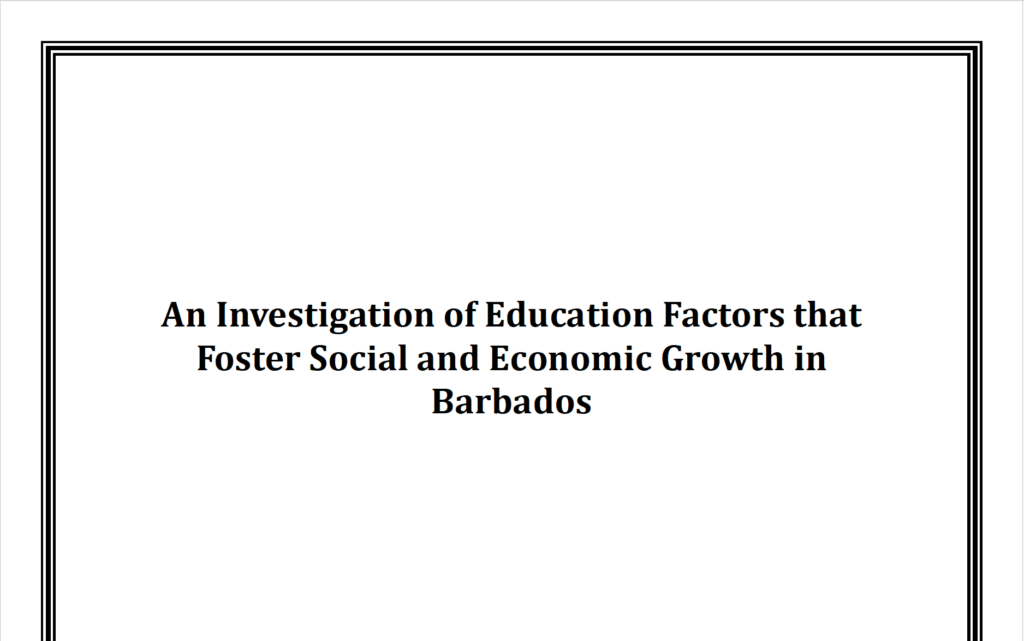
More Reports
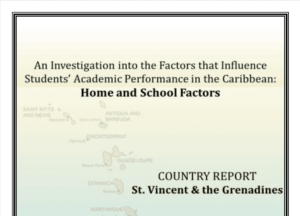
An Investigation into the Factors that Influence Students’ Academic Performance: Home and School Factors – ST. VINCENT AND THE GRENADINES COUNTRY REPORT
Educational practices that originated during the colonial era, when Caribbean nations were under European rule, persist today despite their misalignment with the modern Caribbean context. Recently, there has been a movement towards evidence-informed policymaking to address these outdated practices. An evidence-based approach is crucial for small island developing states with limited resources, such as St Vincent and the Grenadines. This study is a partial response to the growing demand for empirical data to support policymaking. It aims to provide insights into the home and school factors influencing students’ academic progress in St Vincent and the Grenadines. Phase One of the study, conducted in 2017, received funding from the Board of Graduate Studies, The University of the West Indies, while Phase Two, carried out in 2024, was funded by the United States Agency for International Development (USAID).
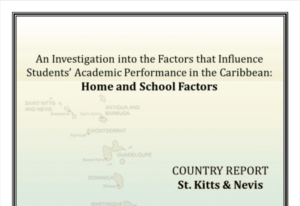
An Investigation into the Factors that Influence Students’ Academic Performance: Home and School Factors – ST KITTS AND NEVIS COUNTRY REPORT
Educational practices that originated during the colonial era, when Caribbean nations were under European rule, persist today despite their misalignment with the modern Caribbean context. Recently, there has been a movement towards evidence-informed policymaking to address these outdated practices. An evidence-based approach is crucial for small island developing states with limited resources, such as St. Kitts and Nevis. This study is a partial response to the growing demand for empirical data to support policymaking. It aims to provide insights into the home and school factors influencing students’ academic progress in St. Kitts and Nevis. Phase One of the study, conducted in 2017, received funding from the Board of Graduate Studies, The University of the West Indies, while Phase Two, carried out in 2022, was funded by the United States Agency for International Development (USAID).
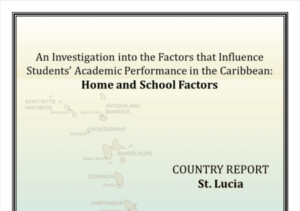
An Investigation into the Factors that Influence Students’ Academic Performance: Home and School Factors – ST. LUCIA COUNTRY REPORT
Educational practices that originated during the colonial era, when Caribbean nations were under European rule, persist today despite their misalignment with the modern Caribbean context. Recently, there has been a movement towards evidence-informed policymaking to address these outdated practices. An evidence-based approach is crucial for small island developing states with limited resources, such as St. Lucia. This study is a partial response to the growing demand for empirical data to support policymaking. This report aims to provide insights into the home and school factors influencing students’ academic progress in St. Lucia. The study was conducted in 2022 and was funded by the United States Agency for International Development (USAID).
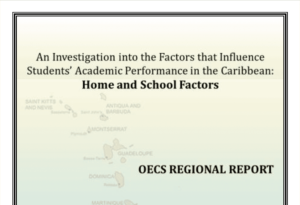
A Pre- and Post-COVID-19 Pandemic Comparison of Home and School Factors that Influence Students’ Academic Performance – OECS Regional Report
Educational practices that are remnants of education systems put in place when Caribbean nations were colonies of European countries still exist today despite the unsuitability of these practices in the modern Caribbean context. Recently, there has been a push for evidence-informed policymaking to address this issue. An evidence-based approach is essential for small island developing states with limited resources. This study is a partial response to the increased demand for empirical data that can support policymaking in the Eastern Caribbean. It aims to provide information to enhance understanding of the home and school factors affecting students’ academic progress in the region.
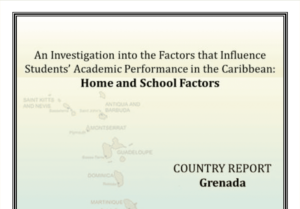
An Investigation into the Factors that Influence Students’ Academic Performance: Home and School Factors – GRENADA COUNTRY REPORT
Educational practices that originated during the colonial era, when Caribbean nations were under European rule, persist today despite their misalignment with the modern Caribbean context. Recently, there has been a movement towards evidence-informed policymaking to address these outdated practices. An evidence-based approach is crucial for small island developing states with limited resources, such as Grenada. This study is a partial response to the growing demand for empirical data to support policymaking. It aims to provide insights into the home and school factors influencing students’ academic progress in Grenada. Phase One of the study, conducted in 2017, received funding from the Board of Graduate Studies, The University of the West Indies, while Phase Two, carried out in 2022, was funded by the United States Agency for International Development (USAID).
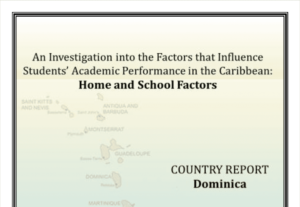
An Investigation into the Factors that Influence Students’ Academic Performance: Home and School Factors – DOMINICA COUNTRY REPORT
Educational practices that originated during the colonial era, when Caribbean nations were under European rule, persist today despite their misalignment with the modern Caribbean context. Recently, there has been a movement towards evidence-informed policymaking to address these outdated practices. An evidence-based approach is crucial for small island developing states with limited resources, such as Dominica. This study is a partial response to the growing demand for empirical data to support policymaking. This report aims to provide insights into the home and school factors influencing students’ academic progress in Dominica. The study was conducted in 2022 and was funded by the United States Agency for International Development (USAID).
